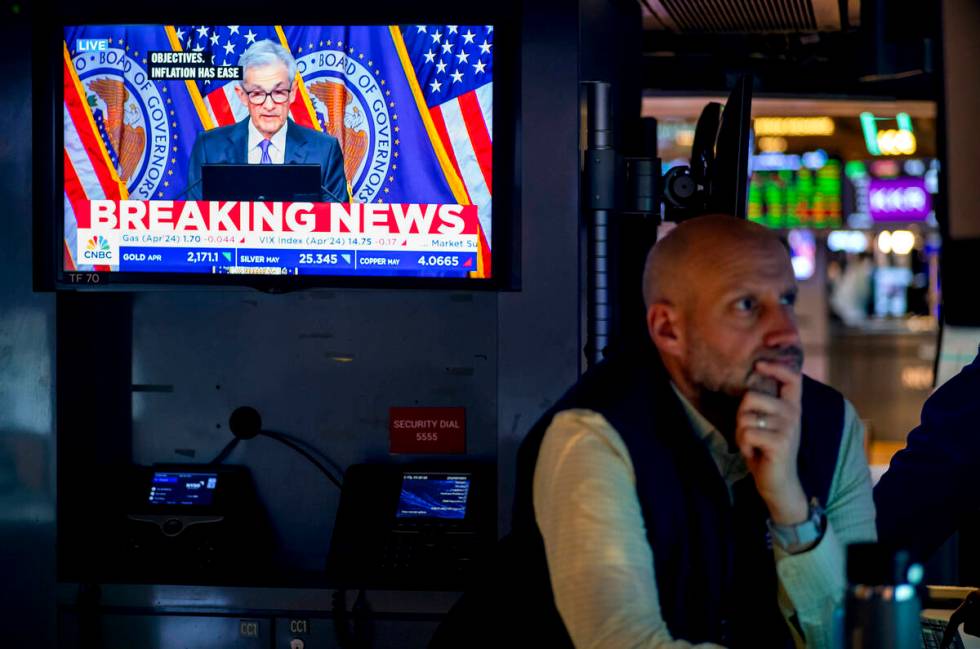Stocks hit record highs after Fed forecasts interest rate cuts

NEW YORK — U.S. stocks rallied to records Wednesday after the Federal Reserve indicated it’s likely to deliver the cuts to interest rates this year that Wall Street craves, despite some discouragingly high inflation reports.
The S&P 500 jumped 46.11 points, or 0.9 percent, to 5,224.62 and set an all-time high for a second straight day. It’s already run up 9.5 percent so far in this young year, which is a bit better than the average for a full year over the last two decades.
The Dow Jones Industrial Average jumped 401.37, or 1 percent, to 39,512.13, and the Nasdaq composite roared 202.62 points higher, or 1.3 percent, to 16,369.41. Both also hit records.
Some of Wall Street’s nervousness coming into the day washed away after the Fed released a survey of its policy makers, which showed the median still expects the central bank to deliver three cuts to interest rates in 2024. That’s the same number as they had penciled in three months earlier, and expectations for the relief that such cuts would provide are a big reason U.S. stock prices have set records.
The fear on Wall Street was that the Fed may trim the number of forecasted cuts because of a string of recent reports that showed inflation remaining hotter than expected. The Fed has been keeping its main interest rate at its highest level since 2001 to grind down inflation. High rates slow the overall economy by making borrowing more expensive and by hurting prices for investments.
Fed Chair Jerome Powell said he noticed the last two months’ worse-than-expected reports, but they “haven’t really changed the overall story, which is that of inflation moving down gradually on a sometimes bumpy road towards 2 percent. That story hasn’t changed.”
Powell said again that the Fed’s next move is likely to be a cut sometime this year, but that it needs more confirmation inflation is moving toward its target of 2 percent.
The Fed has dangerously little room for error. Cutting rates too early risks allowing inflation to reaccelerate, but cutting too late could lead to widespread job losses and recession.
“I don’t think we really know whether this is a bump on the road or something more; we’ll have to find out,” Powell said about January and February’s inflation data. “In the meantime, the economy is strong, the labor market is strong, inflation has come way down, and that gives us the ability to approach this question carefully.”
Fed officials upgraded their forecasts for the U.S. economy’s growth this year, while also indicating they may end up keeping its main interest rate higher in 2025 and 2026 than earlier thought.
“They probably figure they don’t need to cause a recession to tame inflation, and that’s a good thing,” said Brian Jacobsen, chief economist at Annex Wealth Management.
In the bond market, Treasury yields had a mixed reaction.
The two-year Treasury yield, which closely tracks expectations for Fed action, initially jumped before quickly giving up the gain. It eventually fell back to 4.61 percent, down from 4.69 percent late Tuesday, as traders built bets for the Federal Reserve to begin cutting rates in June.
Traders had already given up on earlier hopes for the Fed to begin cutting in March. The worry is that if the Fed waits too long into the summer before lowering rates, it may not end up doing so all year. That’s because of the risk of appearing political if it were to make big changes to policies just ahead of U.S. elections set for November.
The yield on the 10-year Treasury, which also takes into account longer-term economic growth and inflation, initially tumbled after the Fed’s announcement but then swiveled. It was later sitting at 4.28 percent, down from 4.3 percent late Tuesday.
On Wall Street, Mexican food chain Chipotle rose 3.5 percent after announcing its first stock split in history, a move that would lower the price of each share and make it accessible for more investors.
Indexes in Europe and Asia were mixed. Japan’s market was closed for a holiday a day after the Bank of Japan hiked its benchmark interest rate for the first time in 17 years, raising the rate to a range of zero to 0.1 percent from minus 0.1 percent.
The FTSE 100 in London was virtually flat after British inflation in February came in below expectations at 3.4 percent, marking its lowest level since September 2021. That supports hope for rate cuts in coming months.
Zimo Zhong contributed to this report.